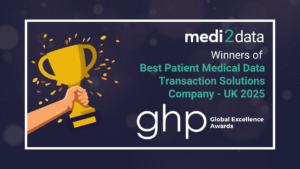The admin burden on GPs and practice staff
Subject to Access requests and patient medical reports are part of the everyday non-clinical services that GP practices provide for insurance companies, solicitors, employers, and government agencies, with the average practice receiving about 12 report requests a week.
Despite encouragement to request reports digitally from the Association of British Insurers, BMA and ICO, over 90% of medical report requests are still sent to GP practices by post.
With GP practices stretched to breaking point and about to embark on the COVID-19 vaccination programme, completing medical reports can very easily slip to the bottom of the priority pile.
The cost of inefficient processes
To process a report manually can take practice staff between 20 to 80 minutes, including scanning, printing, redacting non GDPR-compliant information, passing the information to GPs for approval, and posting the report to the requesting organisation. The practice is also responsible for ensuring fees are paid where applicable.
Internal costs soar as staff time is allocated to these laborious tasks, and the process is open to error which can have dire consequences if reports are lost or not returned on time.
Removing the medical reporting headache
The BMA’s Access to medical reports guide mandates that practices should turn around medical reports within 21 days, but with the average GP practice working 50 hours a week more during the pandemic, how will they find the time? Some GP practices are warning that medical reports may take up to 8-9 weeks to complete.
The answer must lie in the adoption of technology that automates medical reporting, allowing GPs and practice staff to reallocate their time to more critical tasks.
Making the change to digital medical reporting
15-20% of practices have already made the change to digital reporting within their practices which can save up to 82% time and costs.
Haughton Thornley practice in Manchester has gone a step further, having outsourced all their medical reporting, using the eMR+ service from Medi2data, freeing up 18 hours a week.
Deborah Smith, practice manager, and Lorraine Hall, finance officer, saw eMR+ as a logical solution to free up time and reduce stress within the practice.
Lorraine says, “It was a no-brainer for us. Our admin team used to spend hours every week struggling to complete reports, and now it takes just five minutes each morning. We send our instructions to the eMR+ team who manage the entire process, including same day response, Clinician sign-offand billing and payment services.”
Putting quality and security first
Medi2data’s CEO, Richard Freeman, said, “We built eMR+ in collaboration with GPs, clinicians and practice staff to ensure it meets the highest quality and security standards.
GPs like the secure protocols used to ensure high quality redaction processes are used to complete reports. eMR+ automates any fee payments too, which means practice managers can easily keep track of reports and payments, without having to spend time chasing third parties.
“As practices are struggling with an ever-increasing workload, this free service removes some of the non-essential pressure on staff, so their time can be reallocated to other tasks.
“Third parties are happy because they receive high-quality digital reports, and patients are happy because their claim or request is processed quickly, removing the stress and anxiety of waiting for paperwork that directly affects their lives”.










